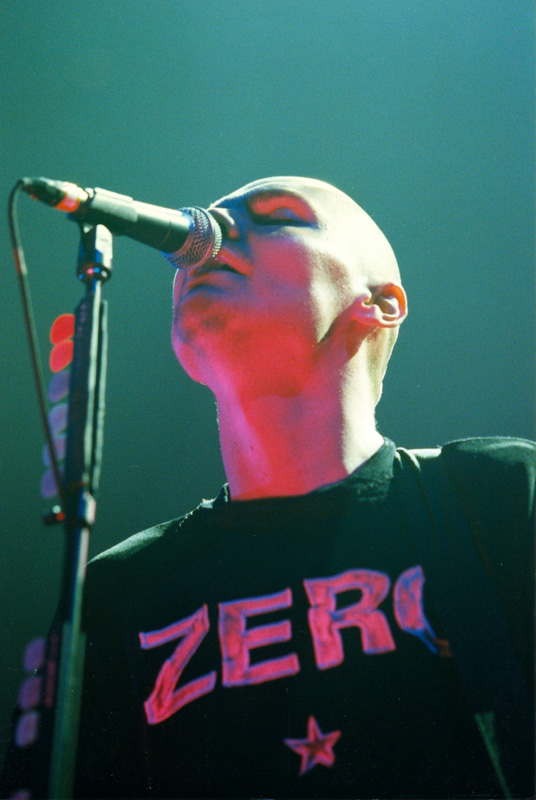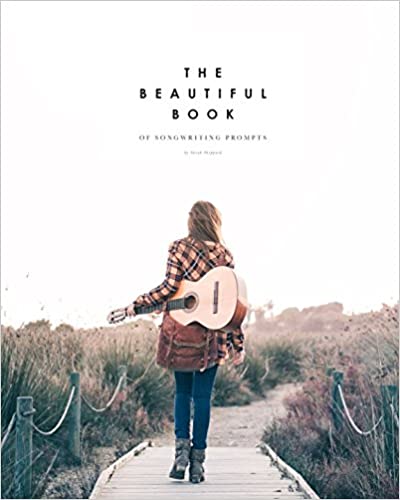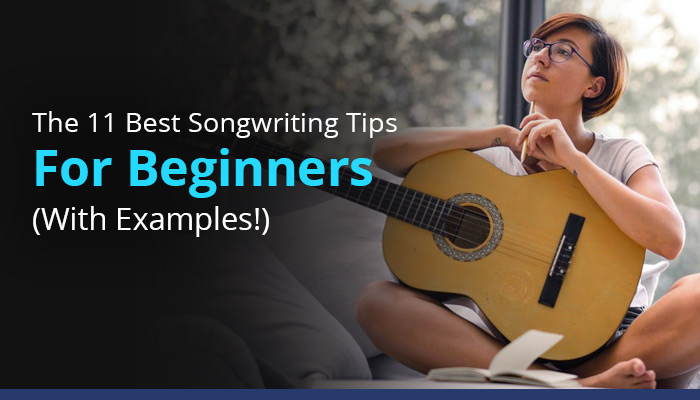Songwriting is an art form that can be very rewarding, but it can also be difficult to master (especially for beginning songwriters). There are a lot of things to consider when writing a song, from the melody and lyrics to the structure and arrangement. There are no rules to songwriting which means it’s hard to tell if you’re doing it right. However, there are some tried and true tips and techniques that other songwriters have discovered over the years. In this blog post, we will discuss 11 amazing songwriting tips for beginners that will help you get started, eliminate writer’s block, and effectively write better songs.
Table of Contents
Tip 1: Keep it simple
The best songs are usually the simplest ones (but this doesn’t have to always be the case!). So, one of our first songwriting tips is to keep it simple and don’t try to overcomplicate things by adding too many chords or lyrics. Stick to a basic melody and chord progression, and build from there. You can always come back and rewrite or add a section that isn’t working, but the important thing is to keep it simple in the beginning.
Although this can vary depending on the style of music you’re writing for, your lyrics should be easy to understand and relate to. No one wants to listen to a song that’s full of gibberish! For pop music, it’s important to keep your language simple and avoid using too many metaphors or similes.
Other types of music may warrant more abstract lyrics and complicated metaphors. However, starting simple and building from there is always a good way to begin writing your songs. You can simply change the format or style later on, as long as you have a concrete idea formed in the beginning.
Example: We’re Going To Be Friends by the White Stripes
We’re Going to Be Friends by The White Stripes is a perfect example of a simple song that paints a picture of a boy’s first day at school. The first verse is crafted in juvenile innocence to set the scene for an experience most of us can relate to, without the use of complicated metaphors or five-dollar words:
Fall is here, hear the yell
Back to school, ring the bell
Brand new shoes, walking blues
Climb the fence, books and pens
I can tell that we are going to be friends
I can tell that we are going to be friends
Tip 2: Write about what you know
When writing songs as a beginner, it’s easy to get caught in the trap of trying to decide what to write about. So, our second songwriting tip is to write about what you know. Write about your life, your experiences, and your emotions. This will help you create songs that are personal and relatable. You can write about breakups, your day-to-day struggles, or even your victories. Songwriting is therapeutic, and it can be a great way to process your thoughts and feelings while simultaneously creating a work of art that other people can relate to.
Example: Kyoto by Phoebe Bridgers
Kyoto by Phoebe Bridgers is a good example of writing about day-to-day life while contemplating various conversations and past events and what they all may mean. The first verse starts with her discussing the day’s events of her time off in Kyoto, Japan:
Day off in Kyoto
Got bored at the temple
Looked around at the 7-Eleven
The band took the speed train
Went to the arcade
I wanted to go, but I didn’t
These simple lines clearly illustrate her day and paint a picture of what she’s doing during her time off in Japan. However, the song continues on to discuss a phone call and past related events and how she goes through processing them during her “boring day off” in Kyoto.
Tip 3: Always be prepared
The best songs usually come when you least expect them. Inspiration can strike at any time, so be prepared to capture those ideas when they come. Keep a notebook or recording device handy at all times, so you can record your song ideas as soon as they come to you.
Neil Young revealed in a recent interview that “everything just stops” when he’s writing a song. He proclaimed that “If you want to write songs, when the song comes to you, you got to stop everything else. No matter what you’re doing, you just leave and you just go somewhere and pick up on what it was you got.”
So if inspiration strikes while you’re in the middle of cooking dinner or taking a shower, don’t hesitate to drop everything and start working on your song. You never know when you might come up with the next big hit!

Notetaking and basic recording mobile apps
Download a notetaking app like OneNote or Evernote to your phone for quick access when you need to jot down a fleeting idea. You can also utilize a quick recording app to get a quick melody or lyrical idea down so you don’t forget it!
Tip 4: Develop a songwriting routine
While jumping on inspiration and riding it out when it strikes is always a good idea, you can’t always sit around and wait to be inspired. Sometimes you’ll need to fall back on a songwriting routine to keep the ideas and words flowing on a daily or weekly basis.
Your songwriting routine doesn’t have to be anything too structured or time-consuming, but it should be something you can stick to even when you’re not feeling particularly inspired. Maybe set aside an hour or so each day to work on songwriting, or schedule two songwriting sessions per week. During this time, you can brainstorm ideas, work on lyrics, or just mess around with melodies until something feels right.
It may also be a good idea to break up lyric writing and music writing just to have dedicated time for both. But the most important thing is to find a routine that works for you.
Billy Corgan of the Smashing Pumpkins has said he is a creature of habit with a daily writing routine. He gets to work on writing songs as soon as he gets up, between 7 and 10 a.m.

Tip 5: Get feedback from other songwriters
One of the best ways for beginning songwriters to improve is to get feedback from other songwriters. Show your song to as many people as possible, and see what they think. Ask them for specific feedback on what they liked and didn’t like about the song. If you’re playing for an audience, watch for cues as to whether they seem to be enjoying the song or not. Be open to constructive criticism, and use it to make your songs even better.
Where to get feedback from your songs
From local open mics to getting feedback from other songwriters online, there are plenty of ways to get feedback on your songs! Here is a list of some of the best places to get feedback on your songwriting:
- open mics
- songwriter showcases
- songwriting forums
- songwriting groups
- songwriting contests
- songwriter circles
- co-writing sessions
Get feedback from social media—especially TikTok!
Social media is a great way to get feedback on your songs from other songwriters, producers, and even fans. Post a link to your song on Facebook, Twitter, or Instagram, and ask for people’s honest opinions. You may be surprised at how much helpful feedback you can get from complete strangers!
You can also perform early live versions of your song on TikTok and gauge people’s interests and reactions. In fact, several musicians have used this method to determine which songs they work on and release. With early validation of a concept or lyrical idea, you can more quickly decide on which songs to flesh out and release and which to toss to the side or trash altogether. And who knows? Your early concept may just go viral before you even have the complete song written!
Tip 6: Use songwriting prompts
If you’re struggling to come up with ideas for your songs, try using songwriting prompts. A songwriting prompt is simply a topic or idea that you can write a song about. Prompts can be anything from “write a song about your hometown” to “write a breakup song”. There are endless possibilities, and using prompts can help to jumpstart your creativity.
Example songwriting prompts
- Rewrite a popular song (don’t plagiarize, just write in your own words)
- Write a song about teenage angst
- Write a diss track
- Write a song about a night out
- Write a song from the perspective of a famous person
- Open the nearest book and write a song based on the first paragraph you read
- Write a sequel to one of your songs or a known popular song
- Write a song about a favorite childhood memory

Pro Tip: Keep a few of these prompts handy so you can try one when the creativity engine isn’t running in full swing.
Tip 7: Use different songwriting techniques
There are many different techniques that you can use to help you begin as a songwriter. Another one of the best songwriting tips is to try out different techniques and see which ones work best for you. Some common techniques include using worksheets, cutting up newspapers, and stream-of-consciousness journaling. Experiment with different methods to really push the boundaries of your songwriting and break through writer’s block.
Use the Cut-up technique
The cut-up technique is a literary technique traced back to the Dadaists in the 1920s. The technique involves writing fully written sentences and then cutting them up into pieces containing one word or a short phrase. Then, the pieces are rearranged to create a wholly new snippet of text. Lots of well-known musicians have used the cut-up technique in their songwriting, including David Bowie and Thom Yorke on Radiohead’s Kid A.
Cut up newspapers
Similar to the cut-up technique, this songwriting technique is very useful for finding themes and breaking up any monotonous songwriting routines you may have fallen into. It’s easy, you simply cut headlines, paragraphs, words, phrases, etc. out of newspapers and use them as you would in the cut-up technique– rearrange and combine to create a wholly new text. Sometimes you may even uncover a line in the paper that would work perfectly as a title or hook!
Use a songwriting worksheet to organize your song
There are various types of worksheets you can use when developing your song. Some songwriting worksheets are great for organizing your song, determining rhyme schemes, arranging your song, and adding additional notes to sections of your song. Others may be used to help you develop concrete ideas and organize your thoughts. Just Google “songwriting worksheet” and you’ll uncover a multitude of worksheets that can be downloaded and used for free on your songwriting journey! You may even want to develop your own worksheet that works for you.
Stream of consciousness
The stream of consciousness technique can either involve your instrument or just lyric writing. You simply just start creating and let it flow; do not judge as you create. If you’re using your instrument, play along and simply sing the words that first come to you. You may even want to record so you can go back and listen in cause you forget what you sang! If you’re just writing, simply jot down your continuous stream of thoughts. Don’t edit. Don’t judge. The idea is to just improvise freely to get your initial ideas and inspiration figured out. You can then come back later and add structure; you may even realize you sporadically came up with a lyric and/or melody that works and doesn’t need editing!
Tip 8: Use strong imagery
When writing lyrics, try to paint a picture in the listener’s mind. Use vivid language and images to create a scene or feeling. This will make your song more memorable and interesting.
Strong imagery involves lyrics that stimulate physical senses and invoke a multitude of emotions in the listener. It can be used to create atmosphere, set the mood, or tell a story.
Some songwriters use place names, objects, and colors in their lyrics to create images. Others focus on using concrete words that describe actual physical sensations. Ultimately it’s up to you, but it’s important to understand that strong imagery should make us feel something, and not just be a bland description of a story or scene.
Example: Sweet Child o’ Mine – Guns N’ Roses
“She’s got a smile that it seems to me, reminds me of childhood memories”
In this line, it’s clear the writer is talking about the smile of a woman but it’s fully described as reminding them of childhood memories. We all have wonderful childhood memories that can bring a smile to our face so we know exactly the type of smile being described. Not only can you picture someone with a bright smile, but you also “feel” the smile as you have an internal understanding of that type of smile yourself.
Bonus tip: Try to use strong verbs when writing song lyrics. Verbs are words that describe actions, and using them in your song lyrics can help create vivid images for listeners.
Tip 9: Draw from your influences
If you’re writing songs then you’re bound to already have a catalog of favorite artists that you are unconsciously drawing from. When you’re feeling stuck, another amazing songwriting tip is to try listening to music from your favorite songwriters and see if that jumpstarts any new ideas.
Smells Like Teen Spirit by Nirvana was inspired by Pixies… and several other artists
Kurt Cobain admitted that the most famous song from Nirvana’s catalog was inspired by the Pixies. He said he wanted to “…write the ultimate pop song. I was basically trying to rip off the Pixies…” and that they “used their sense of dynamics, being soft and quiet and then loud.”
Cobain also admitted that the main riff in Smells Like Teen Spirit was “so close” to the main riff in Boston’s “More Than a Feeling” and that it also sounded like “Louie, Louie.”
Tip 10: Rewrite again and again
The songwriting process is rarely ever linear, so it’s no surprise that rewriting lyrics, again and again, is another great songwriting tip for beginners. You will likely write and rewrite the same song several times before it’s finished. Don’t be discouraged if it takes a while to get the song just right. The best songs often come from a lot of hard work and revision. During the songwriting process, plan to write multiple versions of a verse and have several different takes on a chorus. You can then edit and combine the best of the best lyrics.
Example: Hallelujah by Leonard Cohen
One of the most famous examples of writing and rewriting until perfection in songwriting comes from Leonard Cohen’s Hallelujah. Cohen wrote approximately 80 draft verses during one writing session. The original version from his 1984 album, Various Positions, contained many biblical references.
Tip 11: Collaboration
If you’re still having trouble getting started, try writing with someone else. Collaborating with another songwriter, especially someone that is more experienced, can help jumpstart the songwriting process by giving you a fresh perspective.
These are just a few songwriting tips for beginners to help get you started. The most important thing is to keep at it and don’t give up! With time and practice, you’ll develop your own unique songwriting style that will set your music apart from the rest.
What songwriting tips have helped you? Share your thoughts in the comments below!
Tips to Songwriting FAQ
How can I teach myself songwriting?
Songwriting can be taught by practicing, getting feedback, analyzing other popular songs, and exploring various songwriting techniques. If you want to begin songwriting, it’s important to not get paralyzed by analysis and simply jump in and start doing. Check out our list of top songwriting tips to quickstart your songwriting journey!
What are some songwriting exercises?
There are many different exercises, prompts, and techniques you can use to write a song. You can re-write one of your favorite songs in your own words or write a sequel to a popular song. You can use the cut-up technique to come up with unique phrases you may have not thought of before.
Can you write songs if you can’t sing?
Yes! As long as you can hum a simple melody, you can write songs. You may want to write and let somebody else sing them or record your song into a DAW so you can autotune your vocals (hint: every artist uses autotune even if it’s just to smooth out transitions between notes).
How hard is songwriting?
Songwriting can be hard at times but it can also be easy, especially with lots of practice. There are many ways to write a song, but in general, you need lyrics, melody, and a chord progression. Trying some of the well-known songwriting techniques is an easy way to get started!
How do beginner songwriters get better?
The easiest way to get better as a songwriter is to practice! It’s important to come up with a daily or weekly songwriting routine and to get feedback from other people, including other songwriters! You can also join online forums or a writer’s group to get feedback online.
